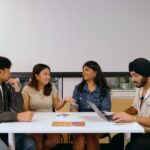What does it mean to embrace and empower neurodiversity? Animation and game design student, Owen, discovered it first-hand when he received his diagnosis as an adult, and now pushes the importance of creating an inclusive environment that fosters the unique talents and perspectives of autistic people.
Ten years ago, Owen met his girlfriend, Lauren. She was autistic – and immediately recognised Owen as being autistic too. Initially, he didn’t believe it, but her insight resonated with him. It took some time, but he eventually received a diagnosis, which has since helped him understand his strengths and limitations, and enabled him to navigate work environments more effectively.
Over time, Owen discovered that openly identifying as autistic helped others understand his unique perspective and thought processes. Being transparent about his condition enabled better communication and garnered respect from those around him.
He says that reflection plays a crucial role for autistic people. Getting caught up in the moment and linear thinking can hinder self-awareness and interpersonal connections, and for him, reflecting on emotions and thoughts allows a deeper understanding of oneself and enables more meaningful conversations. He believes that honest and reflective discussions are essential for maintaining mental well-being, especially for those who may struggle with personal relationships.
“…having the opportunity to actually sit down and talk to somebody honestly and reflect is absolutely essential for mental health.”
Owen’s journey into studying animation and game design was a complex one. With a background in multidisciplinary studies, mathematics and computer science, he initially faced some challenges. After overcoming personal hardships and refining his reflection techniques, Owen found the courage to pursue his passion.
One aspect that captivates Owen about his degree is the ability for students to express themselves through art and engage in meaningful communication. Discovering different ways to describe his ideas and concepts is fascinating, and he finds excitement in merging new and existing knowledge.
Through his experiences, he discovered a passion for tutoring and supporting others through the Curtin Specialist Mentoring Program (CSMP). He first discovered the CSMP when he sought support for completing his assignments. Applying for a Curtin Access Plan introduced him to the opportunity of joining the mentoring program, where he found immense value in the program’s mentoring sessions.
“My mentor Andre talked to me, and he did actually help talk me through getting started with a lot of the projects. Having autism, one of the things that we do is we need to know what we’re doing.”
Throughout his degree, Owen has found the value and importance in establishing connections with lecturers and tutors for neurodiverse students. Building personal relationships with academics and seeking their support can greatly impact the overall educational experience. He encourages fellow students to immerse themselves in their studies, engage with peers, and embrace the opportunity to form meaningful connections.
To create an inclusive environment for autistic people, Owen offers simple yet powerful advice to neurotypical individuals and institutions: listen. By demonstrating receptiveness and understanding, institutions can cultivate an atmosphere where all neurodiverse people feel valued and supported.
Owen wants to change the prevailing misconceptions about autism. Although, he acknowledges the communication gap that exists, he finds joy in sharing his thoughts and engaging in dialogue. He believes embracing this communication barrier fosters growth and understanding, encouraging others to view autism differently.
Owen attributes his sense of empowerment to his diagnosis and his girlfriend, who supports him unconditionally. He wishes for children to be brought up without feeling ashamed of their identity and for individuals to acknowledge their struggles without fearing being labelled as different.
“I would say what I wish to be different is just people’s attitude…basically just people seeing a different beauty in the world and sharing it without shame.”
Overall, Owen envisions a world where people appreciate the unique beauty autistic people see, and believes that with proper support and an enabling environment, autistic people can achieve remarkable results and contribute meaningfully to society.



